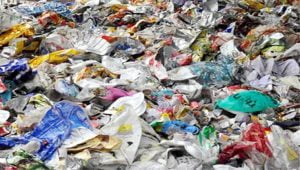World ministers gathered at Nairobi agreed in principle to establish an Intergovernmental Negotiating Committee with the mandate to forge an international legally binding agreement to end plastic pollution.

In a major decision reached by world community to reduce threat from over-use of plastics, the 5th United Nations Environment Assembly held at Nairobi on 2nd March earlier this week concluded with 14 significant resolutions to curb plastic pollution, and help protect and restore Nature worldwide.
The UN Environment Assembly is made up of 193 UN Member States and convenes every two years to advance global environmental governance. The global level environment assembly that convened at Nairobi came up with resolutions aimed at to strengthen ground-rooted actions for Nature primarily to achieve the seventeen Sustainable Development Goals of the UN.
The world’s ministers gathered at this important assembly for the environment agreed in principle to establish an Intergovernmental Negotiating Committee with the mandate to forge an international legally binding agreement to end plastic pollution.

In an official communiqué made available to the media, the Executive Director of the UN Environment Programme (UNEP), Inger Andersen said this was most significant environmental multilateral deal since the Paris accord.
Norway’s Minister for Climate and the Environment, and the President of UNEA-5, Espen Barth Eide said, “Against the backdrop of geopolitical turmoil, the UN Environment Assembly shows multilateral cooperation at its best. Plastic pollution has grown into an epidemic. With the resolution adopted we are officially on track for a cure”.
Amina J. Mohammed, Deputy Secretary-General of the UN, is of the expressed opinion that, “Today, no area on the planet is left untouched by plastic pollution, from deep-sea sediment to Mount Everest. The planet deserves a multilateral solution that speaks from source to sea. A legally binding global agreement on plastic pollution will be a truly welcome first step”.
Along with putting an end to plastic pollution, a second key resolution supports the establishment of a comprehensive and ambitious science policy panel on the sound management of chemicals and waste, and preventing pollution.
The Ministerial Declaration recognizes humanity’s failure to date to manage chemicals and waste, a threat that is further aggravated by the Covid-19 pandemic through widespread use of single-use plastics and disinfectant chemicals.
The media communiqué further stated that in the spirit of the UN Decade for Ecosystem Restoration, a third key resolution agreed by the Assembly focuses on Nature-based Solutions (NbS) which calls for actions to protect, conserve, restore, sustainably use and manage ecosystems. The resolution calls on UNEP to support the implementation of such solutions, which safeguard the rights of communities and indigenous peoples.
Inger Andersen further says that, “Having a universally agreed definition of Nature-based Solutions is important. When countries and companies claim that their actions are supporting NbS, we can now begin to assess whether this is accurate and what it entails. This is especially true given the just released report by the Intergovernmental Panel on Climate Change on the need to scale-up adaptation, for which nature-based solutions will be crucial”.
Three resolutions prioritize ecosystem restoration, biodiversity protection, resource efficiency, consumption and production patterns, climate mitigation and adaptation, job creation and poverty reduction.
A resolution on minerals and metals calls for the development of proposals to enhance their environmental sustainability along their full life cycle.
A second resolution on sustainable lake management calls on Member States to protect, conserve, and restore, as well as sustainably use lakes, while integrating lakes into national and regional development plans.
A third resolution on sustainable and resilient infrastructure encourages Member States to integrate environmental considerations in all their infrastructure plans.
A concluding Ministerial Declaration recognized the risk for future pandemics and other health risks if humanity does not overhaul its patterns of interaction with nature by adopting a holistic approach such as One Health.
In this context, a resolution on animal welfare calls on Member States to protect animals, protecting their habitats and meeting their welfare requirements.
Another resolution on biodiversity and health calls on Member States to reduce health risks associated with trade in live wildlife captured for the purposes of food, captive breeding, medicines and the pet trade, through regulation and sanitary controls.
The Ministerial Declaration stressed the urgent need to halt the global decline of biodiversity and the fragmentation of habitats, unprecedented in human history and driven by changes in land and sea use, exploitation of nature, unsustainable consumption and production patterns, climate change, invasive alien species and pollution of ocean and fresh water, air and soil.
In this context, the Assembly adopted a resolution to accelerate actions to significantly reduce nitrogen waste from all sources, especially through agricultural practices. This action would save up to one hundred billion US dollars annually, the release stated.
In reference to Covid-19 related investments that have largely failed to advance environmental goals, the world’s environment ministers committed to promoting an inclusive and sustainable recovery strategy – a green and just transition – by incorporating biodiversity, climate change and pollution concerns into all policies and tools.
Accordingly, the Assembly adopted a ‘resolution on the environmental dimension of a sustainable, resilient and inclusive post Covid-19 recovery’ to strengthen measures to achieve a sustainable, resilient and inclusive global recovery.
The three-day global meet was attended by about 3,000 in-person and 1,500 online participants from 175 UN Member States, including 79 ministers and 17 high-level officials.
(The writer is a media professional working on environmental issues. He can be reached at [email protected])
